Like much else in China, soccer has developed rapidly and attracted huge investment, but a fan culture has developed that is independent of—and sometimes a challenge to—the state.
Nike. Carlsberg. Samsung. Familiar sponsors flash past on electronic billboards. At the same time, red-letter propaganda banners line the pitch, proclaiming: “The Chinese Dream. You, I, Gather Together. You, I, Advance Together.”
Apart from its name—the “Workers’ Stadium”—and the socialist realist statue outside the entrance, Beijing Guoan’s home ground shows no signs that it was first erected at the height of the Maoist era in 1959. Today the renovated stadium is ringed with slick bars and clubs; posters advertise an upcoming Bruno Mars concert.
China may have not yet made much of an impact on to the world soccer stage. But it is not the country it once was. Along with the meteoric rise of its economy, Chinese soccer has developed rapidly over the past two decades.
Like much else in China, the sport has attracted huge investment, big international companies, and foreign players wanting to profit from the country’s wealth. The world of Chinese soccer mirrors Chinese society in other ways too. Where once all cultural activities were organized and sanctioned by arms of the government, a fan culture has flowered that is independent of—and on occasion a challenge to—the state.
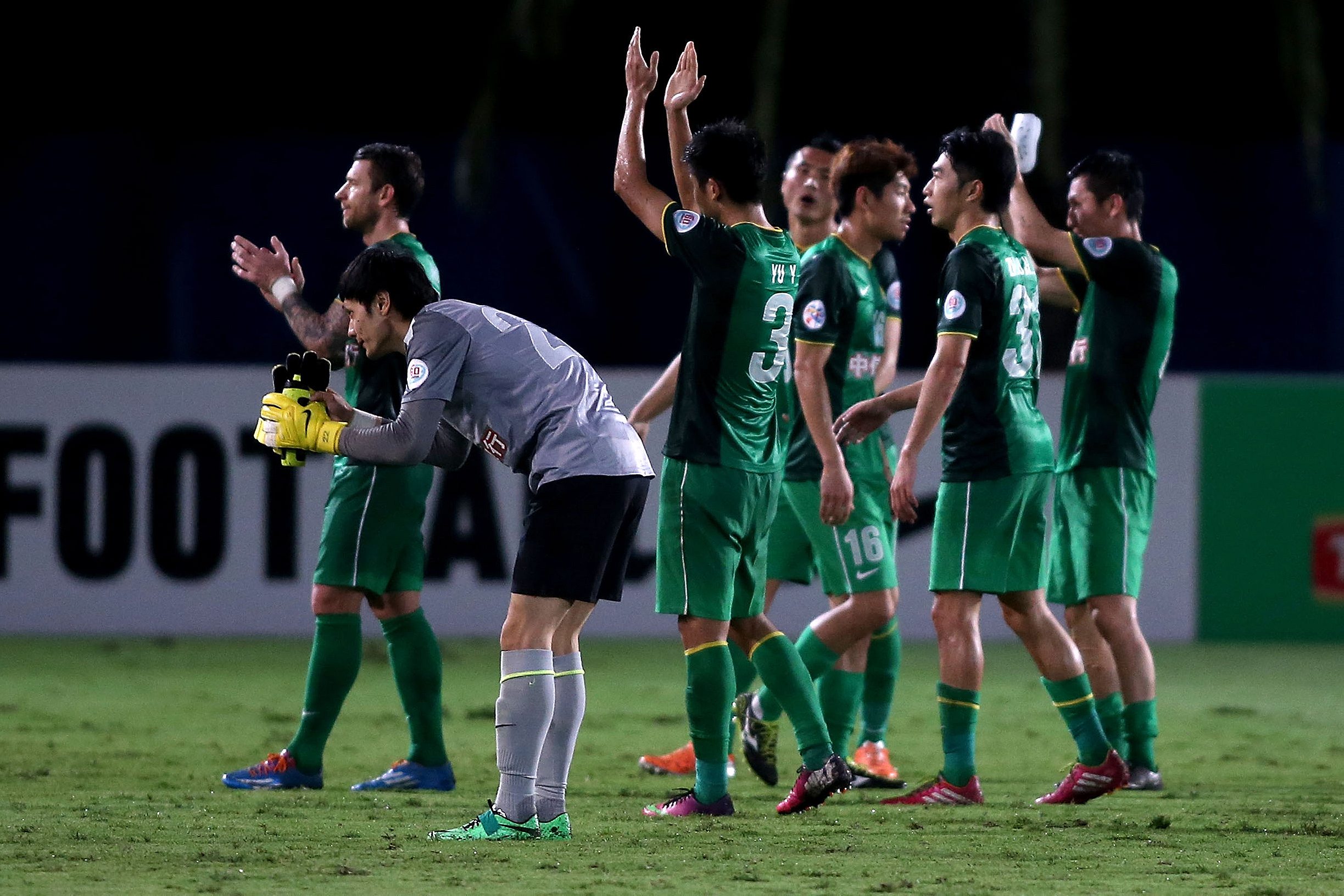
The Chinese football fandom has its idiosyncrasies—the supporters throwing paper airplanes and shouting “cow cunt” (slang for awesome) each time there’s a goal – but as I watch this match between Beijing Guoan and their old rivals Shanghai Shenhua, I am more struck by how similar this soccer culture is to the one I grew up with in England.
Come loss or win, Guoan’s supporters chant through every game. They remain on their feet despite the thick haze of pollution, all too visible under the stadium’s floodlights. Their passion and pain over their local team’s results are every bit as real as that of English fans. And they come to matches in their legions.
The average attendance at the Workers’ Stadium is around 40,000 – a figure that not only dwarves the Chinese Basketball Association’s average attendance of 4,300, but is also bigger than the average attendance for the English Premier League. Not bad, in a country where the first professional national league was founded only twenty years ago.
China is where the earliest form of football in the world was played, according to the FIFA
The history of soccer in China is both short and long. It is where the earliest form of football in the world was played, at least according to the FIFA. Many dispute this claim but we can say with certainty, thanks to images on pottery and references in ancient literature, that as early as the 3rd century BC the Chinese were playing a sport in which two opposing teams kicked a leather ball around a rectangular pitch with bamboo goal posts at either end.
Called “cuju”, literally “kick ball,” it started off as a game of the military and court elite. Pitches were fashioned in the backyards of mansions and palaces. Before it died out following the Mongol conquest in the 13th century AD, cuju was played enthusiastically for over a thousand years. It even developed official regulations and, to enforce them, referees, who were instructed to guide the game with “an honest heart and balanced thoughts.”
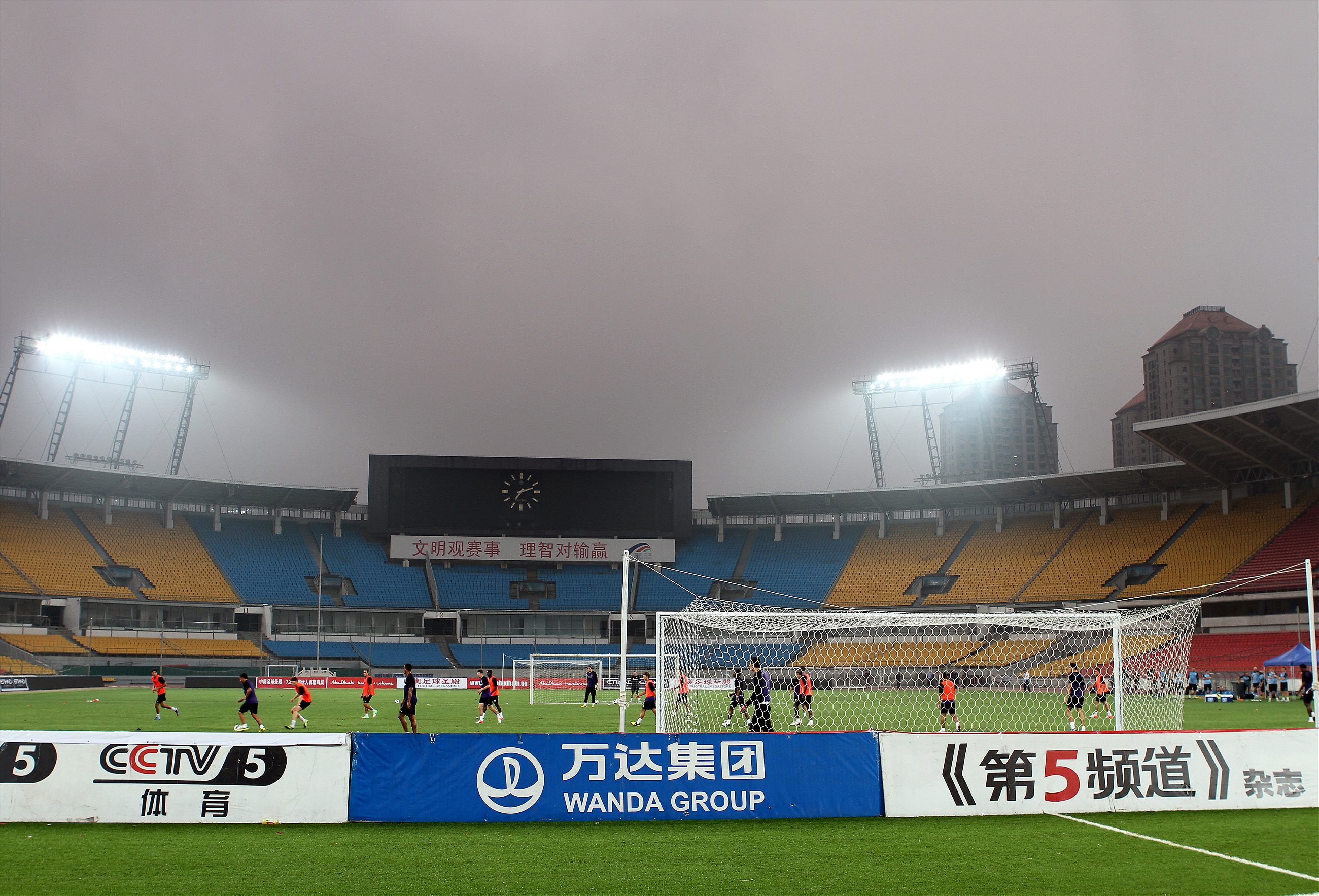
The story of modern professional soccer in China is anything but noble. Founded in 1994, the Jia A, the first professional nationwide domestic league, started promisingly. The broadcasting of top European club matches in the 1980s had whipped up enthusiasm to see the “beautiful game” played in Chinese stadia. By its second season, the domestic Jia A league was being watched on television by 500 million viewers and average attendances hovered around 24,000.
Corruption continued, evidenced by farcical instances of defenders trying to score own goals
But off-the-pitch drama undermined this positive beginning. Bribery, betting and match-fixing made a sham of Chinese soccer. Sponsors pulled out. Calls of “fake ball” were heard from the stands. The number of people watching, both at home and in the stadiums, went into free fall.
The rebranding of the Jia A as the Chinese Super League in 2004 was meant to mark a new era. But corruption continued, evidenced by highly questionable referee decisions and farcical instances of defenders trying to score own goals.
Following a massive cleanup, launched in 2009, a dozen teams have been fined, docked points, or stripped of their titles. More than 50 high-profile figures have been jailed, including national team players and two former heads of the China Football Association. Perhaps most shockingly of all was the conviction of Lu Jun, a referee who umpired World Cup games and was previously known as the “Golden Whistle” for his supposed uprightness. He is now serving five and half years in prison for taking more than $120,000 in bribes.
It’s not uncommon for teams to hire and fire multiple coaches in the span of one season
Bribery is not the only woe to have blighted Chinese soccer. The game is riddled with institutional instability. Teams frequently change owners, names and stadiums. In an extreme case, one team moved from Shanghai to Xian, a city over 750 miles away, and then on to Guiyang, another 550 miles away, in the space of just six years. It’s also not uncommon for teams to hire and fire multiple coaches in the span of one season. With Chinese football in such a volatile, discredited state, it’s a wonder there’s any fans left at all.
And yet, many supporters still keep the faith.
***
Before the Beijing-Shanghai match, I go for a coffee in a nearby Starbucks and find myself surrounded by Guoan fans, their allegiances evidenced by their green jerseys. I strike up conversation with a season ticket holder called Zhang Gaoming. “I could watch it on TV but the atmosphere is much better in the stadium,” he says. “If my friends can’t make it, I’ll go alone.”
Zhang’s biggest concern right now is whether Guoan can top the table this season. They have only won the league once before and have a habit of coming in third place, but he is full of early season optimism. “We have a song about going for number one; away fans mock us, saying we always go for first, then never get it. But I keep believing,” he declares with charming sincerity.
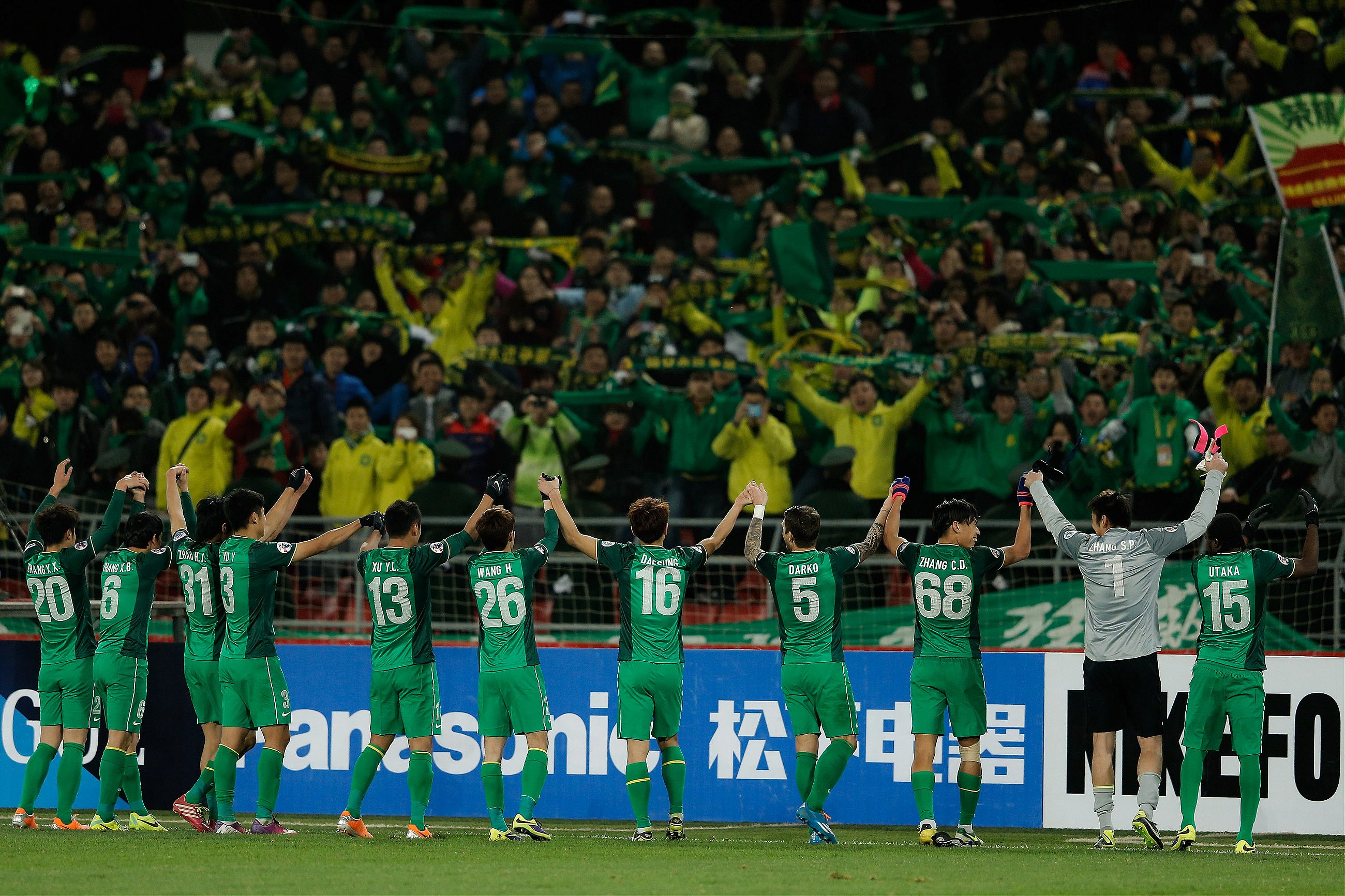
Zhang claims to spend fifteen hours a week watching and reading about soccer, but none of those hours are dedicated to China’s national team. “It’s not that I don’t love my country. It’s because they’re shit.” He’s not wrong. While China cleans up in other Olympics sports and boasts a strong women’s team, the men’s squad are ranked 96th in the world, sitting just ahead of Benin, a country whose entire population is half that of Beijing’s.
The national side has only qualified for the World Cup once, in 2002. Normally they fare better in the regional Asian Cup, but they only just scraped into next year’s tournament. This followed a string of humiliating defeats, including a 5-1 loss to minnows Thailand on home soil last summer, which the local press described as “a dagger deep into the heart of every Chinese football fan.”
Soccer has become a rare outlet for regionalism
Domestic club soccer remains popular. In a country where nationalism runs deep and the strong central authority emphasizes unity, the sport has become a rare outlet for regionalism. Fans chant in local dialects that are sometimes unintelligible to away fans and ridicule rivals by labeling them as their local food specialties: Tianjin are the “steamed buns,” while Shandong are insulted as the “garlics.” Because few towns have more than one professional club, support is concentrated locally. Derbies (rendered into Chinese characters as “德比”, which literally translates as “moral competitions”) between neighboring cities such as Beijing and Tianjin are so wrought with tension that away fans are sometimes banned from attending.
Wearing your team’s colors, putting their bumper sticker on your car, or buying their keychain is a way of showing pride in your hometown. Guoan’s supporters like Zhang often boast that they are “Lao Beijing Ren”, or “Old Beijingers”, whose families have resided in the capital for generations.
Looking at this black-framed-glasses-wearing, wiry 27-year-old as he checks the latest team stats on his Dell laptop and enjoys his pre-game latte, I am reminded of my brother, who is all politeness and bagels before the big match, but once inside the stadium, he’s swearing like a trooper at the ref.
***
I wanted to take my brother to see Guoan when he last visited Beijing but we were thwarted by dud tickets, bought through one of the touts that swarm the Workers’ Stadium on match days.
Fortunately, today’s tickets are not fake. Some 35,000 Beijing fans drown out the 200 or so Shanghai supporters in the away section, who have traveled five hours to watch this Monday night game. As their electrifying camaraderie washes over me, I feel a pang of guilt thinking about how my brother missed out.
Guoan dominates. Minutes before halftime they are awarded a penalty. Everyone around me whips out their smart phones to record Zhang Xizhe readying his kick, his heavily tattooed arms and mop of hair recalling Beckham. The young player, who has been linked to Celtic in Scotland, puts it away easily. As he runs to the sidelines to bask in the crowd’s adulation, the walk-ins in my stand have already turned around to take selfies against the backdrop of the pitch.
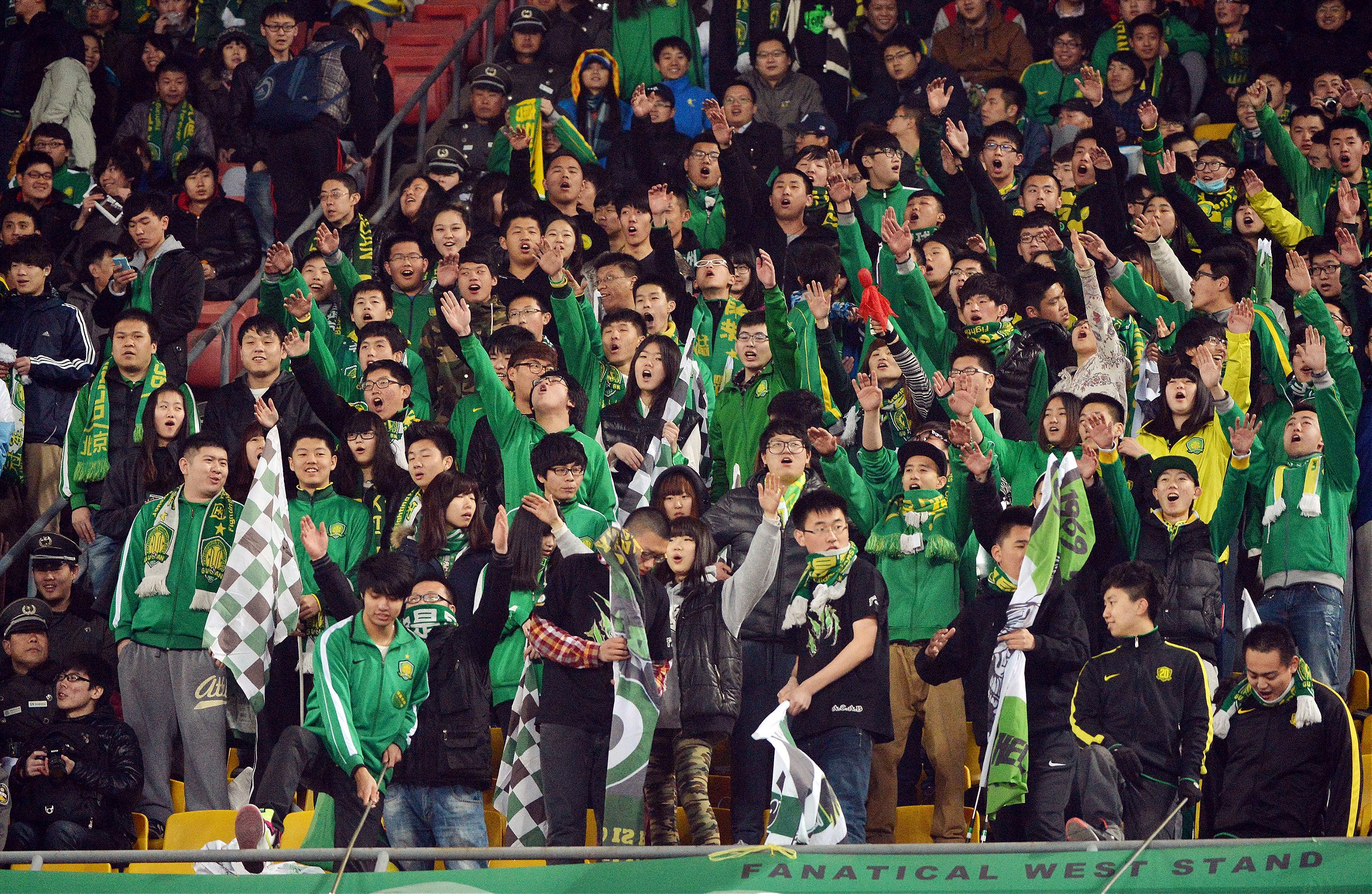
The real supporters are in the north and east stands. They are the ones jumping up and down all night, beating drums, waving homemade flags. It’s from these sections that the terrace tunes originate, including “Our ultimate victory”, an adaptation of a single by a Beijing punk band. (Translated lyrics from Wild East Football.)
We don’t fear our enemies, take up every position
For our shared ideals, we’ll never give up
Put your fist in the air, my brothers
Blood, sweat, tears, and that golden cup; our ultimate victory
After the game I come across one of these diehards, Wang Wenbo. Like many in his section, he comes from Nanchang, a poor area in the south of the city where it’s easy to see that China is still a developing not a developed country. He tells me how his first ever ticket to watch Guoan in a friendly against FC Barcelona cost him his month’s salary as a busboy. Exhibition matches are expensive, but a season pass to see domestic games only costs around $100, so Wang is able to follow every home game.
“Whether Guoan are playing well or not, we go to all the games and cheer for them,” says Wang, the “we” referring to Green Wings, a group of 150 supporters to which he belongs. “We also play football together and discuss the game at dinners. Guoan is so important for us.”
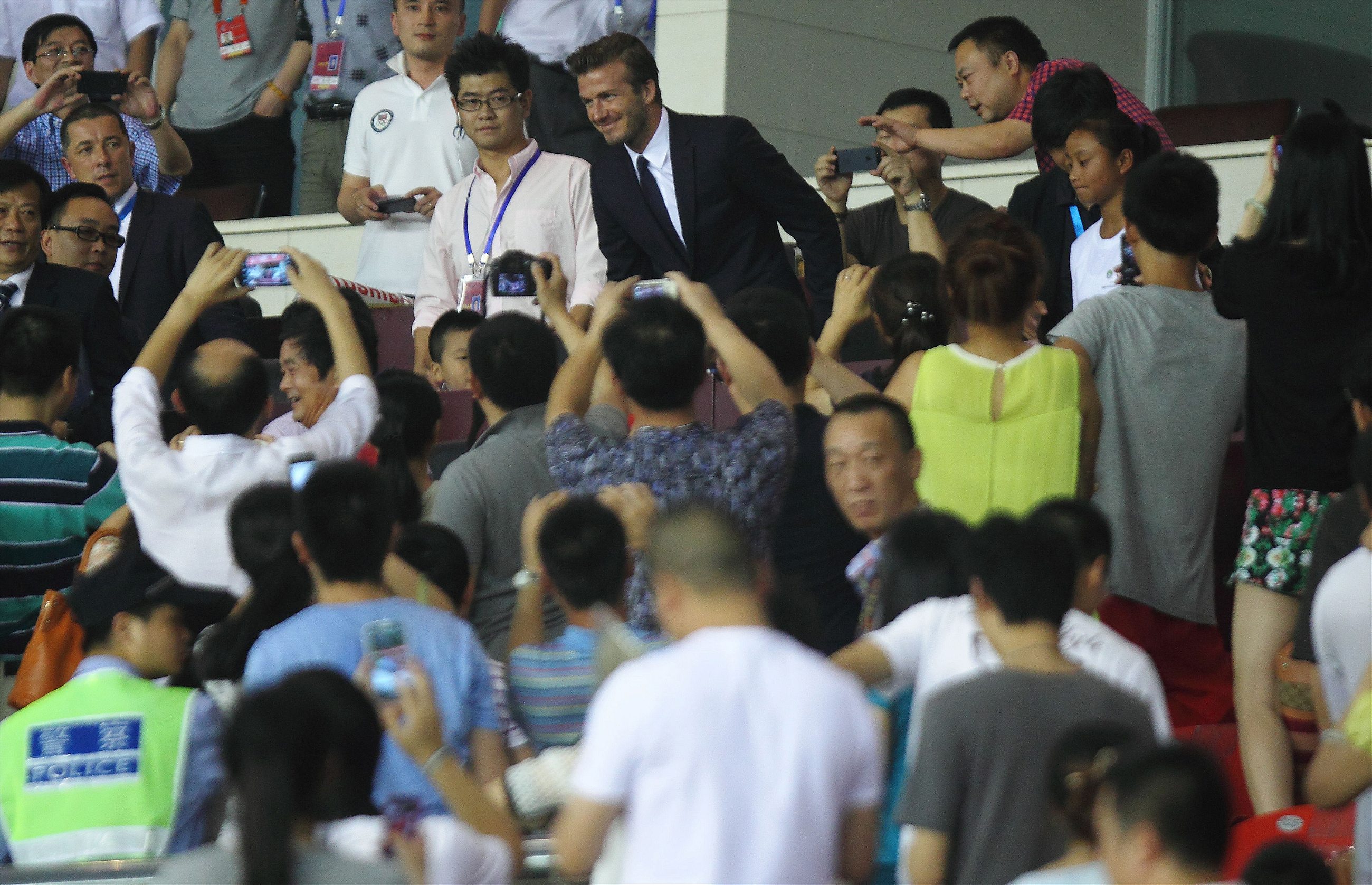
Soccer is known for being a tribal game. In recent years, Guoan’s supporters have splintered into several sub-tribes. During the first decade of the club’s existence there was only Green Hurricane, the official supporters organization, backed by the club. Today they still occupy most of the east stand midfield. At the end of games, they hold their green scarves above their heads, then bow in unison; their perfect synchronization won’t be surprising to anyone who has seen Chinese school children during their morning drills.
Fashioning themselves after Europe’s diehard ultras supporters, a group broke off from Green Hurricane in 2005. They colonized the north stand, understanding its symbolic importance to ultras worldwide. They called themselves the “Yulinjun,” a reference to the garrisons that guarded the capital in imperial times. In the last couple of years more splinter groups have formed, including the Green Wings, the Green Flags and the Union of Brothers. But the Yulinjun are still the most vocal. They, more than others, can lay claim to being Beijing’s Green Army.
“We don’t accept funding from the club. The flags, the t-shirts, we pay for everything out of our own pocket because we love the team,” says Li Pengzi, a green-haired Yulinjun member I met outside the stadium. He complains that Green Hurricane are entitled to purchase more than 2000 seasons tickets, while the Yulinjun are allotted only 370. “There’s a lot of limits placed on us. Even on the number and size of the banners we can bring in.”
The club has a curious relationship with the supporter groups. It wants to promote them, as long as they stay within its control. The leaders of each section are asked to meet with the club before every game, and are held to account if any of their members step out of line. “Fans are not important for them,” says Li. “They just don’t want trouble. They’re more worried about discipline and order.”
***
The Chinese state’s efforts to keep Guoan fans in check are more conspicuous than the club’s. Surveying the stadium during the match I lose count of all the uniformed personnel. Garden-variety security guards keep watch over each section. Military policemen, straight-backed and resplendent in their khakis, peaked caps and white gloves, occupy almost every seat in the front row of the entire stadium. Lest trouble kick off between the two sets of supporters, the four stands either side of the away fans are kept completely empty, save for a smattering of navy uniformed regular police.
Outside the stadium the security presence is even more overwhelming. I count four police vans and forty military police officers with riot shields at every gate. Backup, in the shape of armored trucks and coaches full of extra policemen, wait just a bottle’s throw away.
Chinese soccer has had its share of hooliganism. Brawls occasionally flare up, along with other heated incidents like the burning of scarves and even cars. In a match last season against Hangzhou, I saw Guoan fans climb atop the plastic tunnel leading to the changing rooms and throw objects at the visiting players as they left the field. Yet this extraordinary security presence seems out of proportion to the threat.
The Chinese state is deeply suspicious of youths massing together
What’s at issue is more than soccer hooliganism. The Chinese state is deeply suspicious of youths massing together, especially in the capital. Even music festivals are seen as a potential threat and are often canceled or banished to distant suburbs at the end of the metro lines.
The week before the match, Taiwanese students had broken into and occupied their parliament. Worried that their actions might inspire young people in the Chinese mainland, the state tightened its grip on the Internet and other forums of public expression. With this backdrop of state paranoia, it’s easy to see how angry football fans have come to be feared by the government.
***
Soccer culture offers an analogy for China today: an edgy government allows a certain amount of free expression (in the case of spectators, the freedom to shout “shabi,” or “stupid cunt,” at the ref) but is ready to crackdown at any moment. As in most other sectors, power in soccer is concentrated in the hands of state-owned enterprises and wealthy tycoons with political connections.
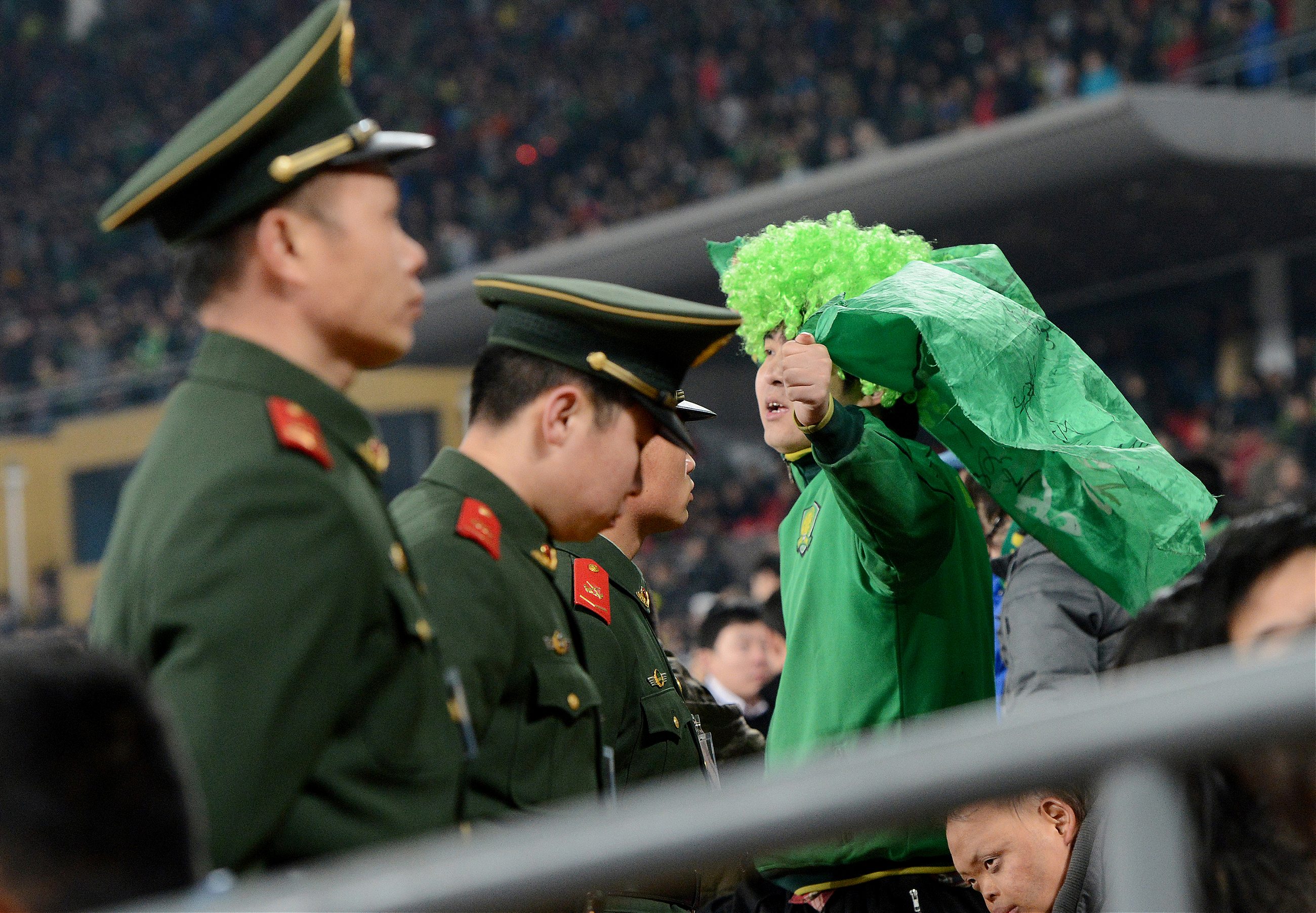
Fans worldwide struggle with the problem of owners interfering in the normal functioning of their clubs. But even my brother – whose team, Leeds United, has been brought to its knees over the last decade by a series of overambitious but underfunded owners – doesn’t face the travails of the average Chinese supporter.
Imagine, for example, being a follower of Dalian Shide, a club that won the league eight out of its first twelve seasons. With tears in their eyes, fans and players endured a final match in November 2012, knowing their club would probably fold after its billionaire owner was detained following a political scandal. Brief hopes that the club might be rescued by a takeover bid by their local rivals, Dalian Aerbin, were soon snuffed out. On January 31, 2013, without pomp or ceremony, the association pronounced Shide dead.
For seven long years, Shanghai Shenhua supporters had to put up with Zhu Jun, a chairman who took meddling to a new level. He forced managers to let him play with the team in friendlies against Liverpool and Manchester United. Following disputes with other shareholders, he threatened to withhold player salaries, which led international stars Didier Drogba and Nicolas Anelka to walk away before their contracts were completed. No sooner had Zhu Jun’s absurd reign come to an end earlier this year than the new owner, a powerful state-owned real estate developer, announced that the club would be renamed from Shenhua to their company name, Greenland.
Fans had enough. In the fortnight preceding the Beijing-Shanghai match, they chose to lock horns with the club management. At Shanghai’s first home game, on March 15, the north and south terraces remained seated and silent for the first 19 minutes of the game. On the twentieth, they broke into a thunderous refrain of “Give us back Shenhua.”
“The mayor of Shanghai was there and Greenland’s big boss. It was such a loss of face. You could feel it in the air,” says Cameron Wilson, founder of wildeastfootball.net, an encyclopedic site of Chinese football. Originally from Scotland, Wilson has followed Shanghai since its first fan group, the Blue Devils, formed in 2000. “The club thought the fans would shut up. But they are as hardcore as UK fans,” he says, “and more organized.”
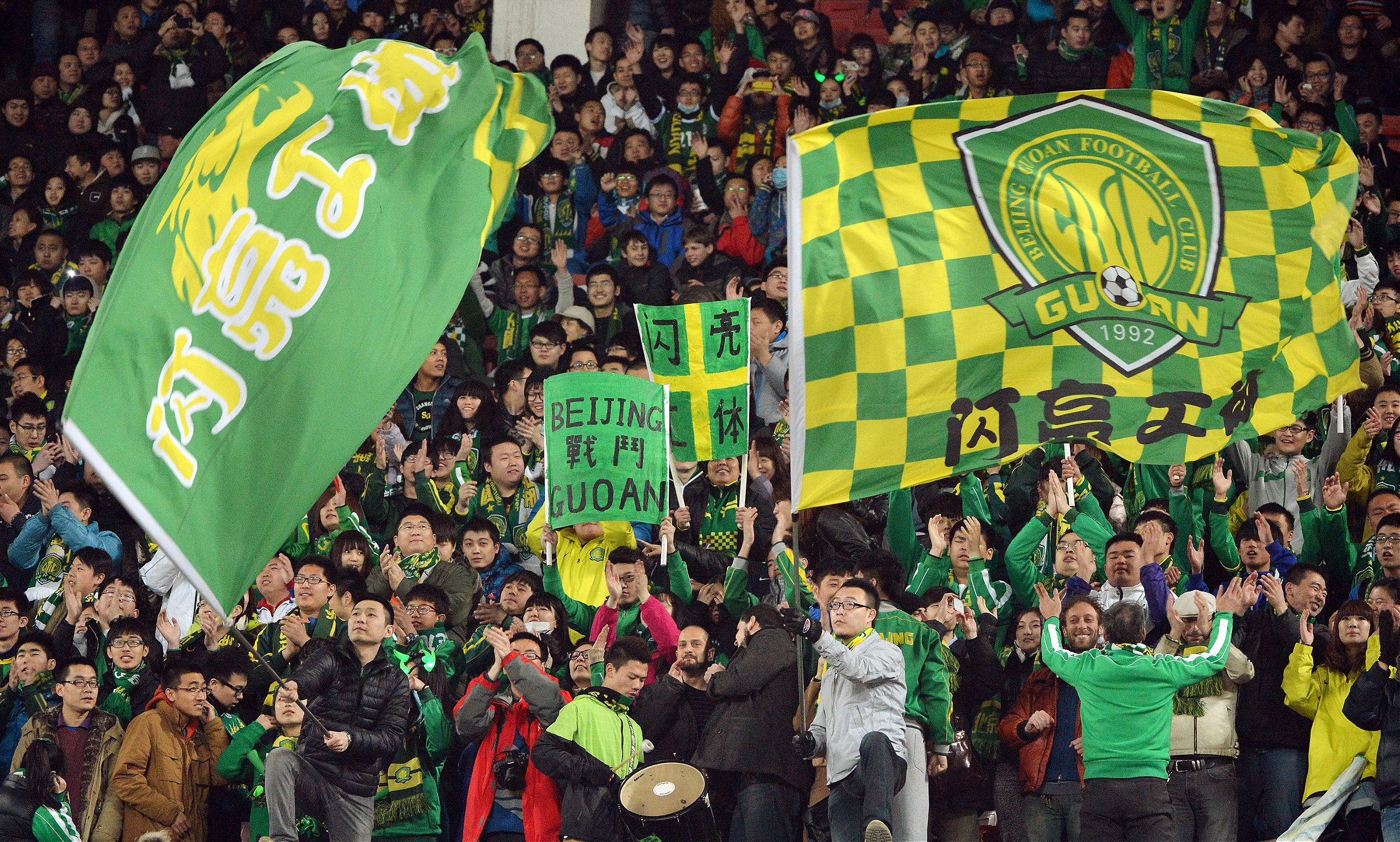
Shenhua’s supporters couldn’t be as outright in their criticisms of their owners as Manchester United fans have been of the Glazer family. But they knew how to make their voices heard. Employing a tactic common to Chinese protesters who don’t want to risk the full wrath of the authorities, one group of Shenhua supporters held up a banner quoting from China’s president, Xi Jinping. It read, “Abandoning tradition is tantamount to severing your spiritual lifeline.”
Their protests appear to have worked. Two days before the match against Beijing, at a meeting with Shanghai’s main fan groups present, Greenland announced that it would put Shenhua back in the club name. Just as public outcry has led the Chinese government to begin to address the country’s pollution problems, Shenhua’s supporters have shown that sometimes ordinary people can effect change in China.
“The past couple of seasons have been a real eye opener for fans,” says Brandon Chemers, a Chicago-raised Guoan supporter with whom I share a drink in a bar near the Workers’ Stadium, a few days after the match. A season ticket holder since 2007, he is the only foreign member of the Yulinjun. He shows his devotion by constantly saying “we” or “us” when he refers to Guoan’s supporters. “It’s woken us up,” he says. “What would happen if Beijing moved? Or if our owners sold us?”
Beijing Guoan has the largest and most loyal fan base by a long way. Owned since its establishment in 1992 by CITIC, a state-owned investment company, it has enjoyed a more stable history than most Chinese clubs. But if the club’s fans felt the integrity of the club was being threatened, how would this army of supporters mobilize?
[Header image by: Tony Feder/Getty Images]
